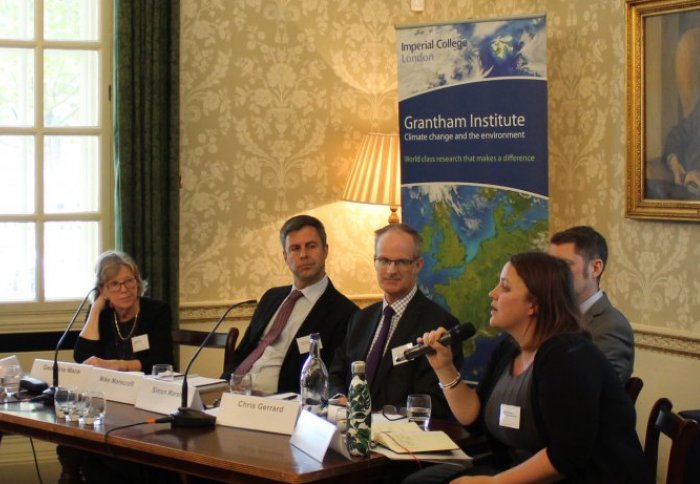Grantham Institute begins 10th anniversary celebrations with look to the future

Experts looked ahead to the next 10 years of action on climate change at an event to launch the Grantham Institute 10th Anniversary Outlook 2017-18.
The Outlook 2017-18 highlights examples of how staff and students at Imperial College London are advancing the Grantham Institute vision for a sustainable, resilient, zero-carbon society, and asks what challenges the next ten years could bring.
The launch event, which included a panel discussion with experts from the public sector, government agencies, businesses, NGOs and academia, looked ahead to the next decade, focusing in particular on adaption to climate change – an area that still requires extensive research and practical action.
Professor Sir Brian Hoskins, the first Director of the Grantham Institute and now its Chair, opened the discussion by reflecting on ten years of activity at the Institute, highlighting its role in bringing climate change science and action into the public domain.
Climate change is already changing the natural world, and current action is insufficient.
– Simon Marsh
Head of Sustainable Development at the RSPB
He noted in particular its high profile annual lectures, which have included Paul Polmann, CEO of Unilever and Christiana Figueres, former Executive Secretary of the UN, and this year will be delivered by Al Gore, Former Vice President of the United States.
He also referenced the leading role of the Grantham Institute in setting up the Climate Change Knowledge and Innovation Centre (Climate-KIC), which helped establish innovation and new technology as essential tools for tackling climate change.
Reflecting on the past decade, Professor Hoskins described a number of key changes to the environmental policy landscape, noting the UK Climate Change Act of 2008, the subsequent establishment of the independent Committee on Climate Change, and the Paris Agreement on Climate Change.
Successes achieved, challenges ahead
The panel of speakers all agreed that, while some progress has been made, much remains to be done. Over the past ten years, the transition to a low-carbon power sector has made encouraging progress.
The goal of reducing greenhouse gas emissions is a clear, understandable driver and, with technology such as solar panels and electric vehicles becoming gradually more available, the move to a more climate-friendly economy seems to be underway.
However, that is not always the case for adaptation to climate change. “Climate change is already changing the natural world, and current action is insufficient,” said Simon Marsh, Head of Sustainable Development at the RSPB, citing the recent Committee on Climate Change Adaptation report.
“The vulnerability of the natural world has not reduced in the last two years – if anything, it’s increased. Research suggests that the climate will become unsuitable for the Dartford Warbler, already in decline, across large parts of its southern range in Europe as a result of a changing climate.”
No clear-cut solutions
Professor Georgina Mace, Professor of Biodiversity and Ecosystems at University College London, explained that the complexity of the adaptation challenge means there is rarely a clear-cut solution. “Nowadays, we have a much better understanding of the multiple drivers of change, and we need to consider these multiple drivers when quantifying climate change impacts,” she explained.
“We need to address them with a systems-approach”. She suggested that it is precisely this systems approach that makes it hard to create one single adaptation target that can act as a driver for change, in the way that mitigation targets have operated in the past.
Even so, Nancy Hobhouse, Sustainability Manager at John Lewis Partnership, noted that climate change adaptation is becoming a concern for the private sector. She cited examples of supply chain disruption related to extreme weather events and the challenges of refrigeration at high temperatures.
Yet she acknowledges that while these commercial drivers are part of the answer, they will not apply to the full gamut of adaptation actions, such as those that protect biodiversity as it is the right thing to do.
One of the key challenges for climate change adaptation is getting the targets and goals right, so that they are meaningful, effective drivers of change. Dr. Mike Morecroft, Principal Specialist, Climate Change at Natural England, emphasised that adaptation actions can have multiple benefits.
For example, including green spaces in urban centres can help cool areas particularly prone to climate-change induced heat waves, and well-designed agri-environment schemes can deliver good quality food to people whilst protecting biodiversity.
Partnerships are critical for climate solutions
Significantly, all of the panellists recognised the need for a more concerted effort to work with others to find solutions. As adaptation is such a complex issue, partnerships between practitioners in conservation, business, and the academic sector are essential. For example, Chris Gerrard, Natural Catchment and Biodiversity Manager at Anglian Water, spoke of the importance of a rounded approach to water resource planning, one that involves water companies, farmers and industry.
Other topics discussed included the role of the individual in environmental action, the importance of a strong research base, the power of positive messaging and the potential of technology to create climate solutions.
The Grantham Institute remains committed to working with a range of external partners across the climate change and environmental space. Over the coming decade, the Institute will be working to find solutions to the complex challenges of climate change adaptation, contributing to more actions that will improve our resilience to climate change.
This event kicked off a series of activities to celebrate the Grantham Institute’s tenth anniversary year. To stay up to date with the latest news and events from the Grantham Institute, sign up to our newsletter.
The Grantham Institute 10th Anniversary Outlook 2017-18 is available to download here.
Article supporters
Article text (excluding photos or graphics) © Imperial College London.
Photos and graphics subject to third party copyright used with permission or © Imperial College London.
Reporter
Lottie Butler
The Grantham Institute for Climate Change
Alyssa Gilbert
The Grantham Institute for Climate Change